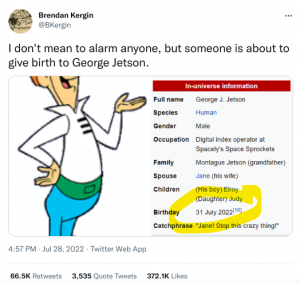
Retrieved from https://twitter.com/BKergin/status/1552760072576438272
A timely Twitter post about living in the future- someone would have given birth to George Jetson last week! The iconic cartoon show from 1962 shared some fantasies about what living 100 years from then would be like. I remember scenes from the show of hovercrafts flying around and robot helpers at home- not too far from reality. My two speculative narratives are loosely based on the show with some plausible or even possible events in 30 years. (Dunne & Raby, 2013)
In the Leading Lines podcast, one of the panelists, Doug Fisher, references how digital technology could support IEPs for all students. I used this as a guide for my design as well as incorporating the HyperHuman design by IDEO from Core77 as part of the narrative. As an elementary teacher, the future of education and the role of the teacher will be greatly impacted by AI. Educators will need to refine and advance their skill sets to stay relevant in the field. That is the origin of my storyline- how technology can be implemented to enhance the profession in a utopian perspective, but also threaten it from a dystopian viewpoint. As Harari (2017) predicts in her article, “In the twenty-first century, if the masses lose their economic value they might have to struggle against irrelevance rather than exploitation.” This could be the downfall to AI in education replacing human jobs. If my career plans are in place, I should be retired in 30 years, so I wonder if I would have the opportunity to live this narrative, or at least some parts of it.
The speculative design itself- the “EdVe”- is a robot EA that uses AI to support the teacher in planning lessons and assessments. Its main feat is the ability to generate Individualized Education Plans for each student that is connected to a personalized augmented reality machine used to transform the learning experience. Please enjoy the video below:
References:
Dunne, A. & Raby, F. (2013). Speculative Everything: Design, Fiction, and Social Dreaming. Cambridge: The MIT Press. Retrieved August 30, 2019, from Project MUSE database.
Hariri, Y. N. (2017). Reboot for the AI revolution. Nature International Weekly Journal of Science, 550(7676), 324-327.
All pictures in the video from https://www.istockphoto.com
